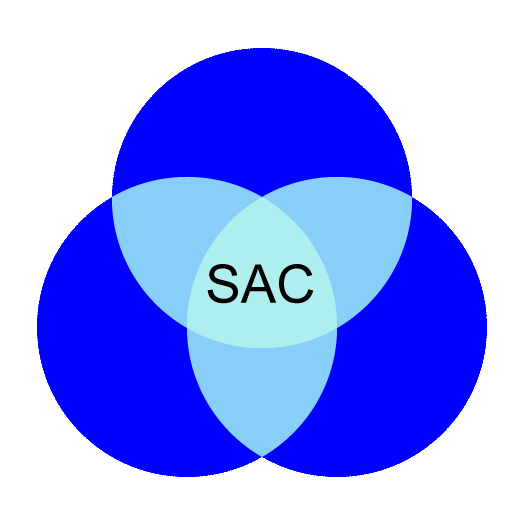Comment and Discussion from the SAC
The “Comments” section of the SAC website, which is being developed as and when individuals submit comments, is intended for short statements, in contrast to the longer Occasional Papers. All comments published on this website represent the personal opinions of the authors and are provided as a contribution to debate. Publication does not imply they are endorsed by the SAC membership collectively or individually.
The Asociación Civil Amigos Malvinas/Falkland (ACAMF)
and the Promotion of Cross-Border Relationships at Citizen Level
Robin Wallis, the Hon. Secretary of the SAC, reports on his contacts with ACAMF
During 2013 the Rosario-based Asociación Civil Amigos Malvinas/Falkland (ACAMF) contacted the SAC to make us aware of their objectives. When I was in Buenos Aires in August 2013, I took the opportunity to meet ACAMF's President Ricardo Gómez Kenny and Secretary Gabriel di Bernardo. They invited me to become a member of ACAMF's Liaison Sub-Committee ('Subcomisión de Enlace') and I accepted on an ad hominem basis. The purpose of the Sub-Committee is to promote cordial relations between Argentine citizens and Islanders.
On 31 March 2014 I was in Buenos Aires again and attended the first meeting of the Liaison Sub-Committee. For ACAMF – which began as a school project in 2000 and has gradually grown into an organisation endorsed by various groups in the city of Rosario – this event marked a step forward. ACAMF officials used the occasion to emphasise the political neutrality of their movement and stressed their focus on citizen-to-citizen contact. The theme of common humanity linking all people was symbolically re-inforced by the exhibition of the roll of honour of those fallen in the Falklands conflict, which had been painstakingly put together by ACAMF with service personnel from both sides listed together alphabetically, rather than divided by nationality. This theme was echoed by contributions at the meeting from Argentine ex-combatants from the Falklands War who were now supporting the ACAMF initiative to re-establish the kind of friendships that existed at citizen level between the Islands and the mainland before the 1982 conflict.
Invited to speak, I remarked on the following characteristics of civil society involvement in the South Atlantic issue:
- a belief that concerned citizens can influence events in a context where neither politics, diplomacy nor international law has been able to settle a dispute for nearly two centuries;
- the conviction that the status quo does not represent the optimal set of relationships attainable between the parties; and
- the hope that elections in the UK and Argentina in 2015 may bring fresh thinking: in particular, a new Argentine administration would be likely to reassess the policies of the Kirchner years and to consider whether other options might be more suitable.
I suggested that the British Foreign Office would not be able to respond to a citizen-level initiative of this sort. By contrast, the Argentine Foreign Ministry – whose approach to the Islands has fluctuated since 1982 – has welcomed ACAMF representatives and given a hearing to their ideas, just as the Argentine Embassy in London has been open to dialogue with the SAC. However, the current Argentine government has not been willing, either in Buenos Aires or in London, to engage in any dialogue with Falkland Islanders.
Suitably enough, this event was attended not only by persons old enough to remember and to have participated in the 1982 conflict, but also by students both from the UK and Argentina. Opinion polling in the UK in 2012 showed that the under-24 age group was the generation most likely to be able to reassess the South Atlantic issue in a manner independent of previous generations' thinking. Indeed, some academics have proposed that meetings should take place between young people from Britain, the Islands and Argentina to generate fresh thinking. It will be interesting to see how twenty-first century adults improve on their forebears' response to the situation in the South Atlantic.
Robin Wallis, 7 May 2014

